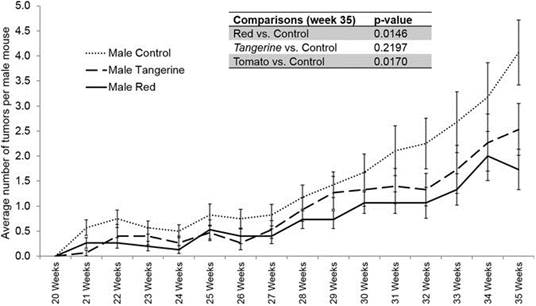


《Scientific Reports》近期一篇报道称,让小鼠每天食用西红柿能降低一半皮肤癌发病率。这项研究表明营养干预能改变患皮肤癌的风险。
让雄性小鼠每天摄入占膳食总重量约10%的番茄粉,连续35周后再将它们暴露在紫外线下,与不吃脱水西红柿的小鼠相比,实验组小鼠的皮肤癌发病率下降了50%。
美国癌症协会声称,非黑色素瘤皮肤癌是最常见的癌症,2012年新增病例数为540万,是乳腺癌、前列腺癌、肺癌和结肠癌的总和。
据美国健康与人类服务部报道,尽管这种癌症的死亡率低,但其发展速度快、治疗费用仍然昂贵且影响美观。
番茄与癌症
膳食类胡萝卜素(番茄着色化合物)可以保护皮肤免受紫外线伤害,俄亥俄州立大学食品、农学和环境科学学院食品科学与技术系的Jessica Cooperstone如是说。
但是,本研究中的雌性小鼠的患肿瘤数量并无显著差异。之前的研究表明,雄性小鼠在受紫外线照射后所获得的肿瘤数量更多、更大、更具侵袭性。
“这项研究还告诉我们,探索不同预防策略使应考虑性别因素,”通讯作者、俄亥俄国家综合癌症中心成员Tatiana Oberyszyn说。“对男性有用的未必对女性也同样有用,反之亦然。”
先前人体临床试验表明,食用番茄酱可以防止晒伤,可能原因是保存在人类皮肤中的类胡萝卜素能阻止紫外线伤害,Cooperstone说。“番茄红素是番茄中主要的类胡萝卜素,是其中最有效的抗氧化剂。但是,与人工合成的番茄红素相比,食物番茄在防止紫外线照射后发红方面更有效果,表明番茄中还可能存在其他起作用的化合物。”
在这项研究中,研究人员发现喂食脱水红番茄后,只有雄性小鼠肿瘤生长数量减少。而喂食橘红色番茄(比红番茄含有更多番茄红素)的小鼠出现肿瘤的数量虽少于对照组小鼠,但数量差异不具备统计意义。
Cooperstone正在研究番茄红素以外的其他番茄化合物对健康的潜在影响。
“平易近人的系统性保护方法,如营养干预,对皮肤相关疾病具有显著益处,”Cooperstone说。“食物不是药物,可以吃一辈子,但是它们却可能改变某些疾病的发展。” (来源:生物通)
Tomatoes protect against development of UV-induced keratinocyte carcinoma via metabolomic alterations
Abstract Prolonged tomato consumption can mitigate ultraviolet (UV) light induced sunburn via unknown mechanisms. Dietary carotenoids distributed to skin are hypothesized to protect skin against UV-induced damage, although other phytochemicals may play a role. We hypothesize that tomato consumption would protect against skin cancer. SKH-1 hairless and immunocompetent mice (n = 180) were fed AIN-93G or AIN-93G + 10% tangerine or red tomato powder for 35 weeks. From weeks 11–20, mice (n = 120) were exposed to 2240 J/m2 UV-B light, 3x/week, and tumors were tracked weekly. Control mice were fed the same diets but not exposed to UV. Tumor number was significantly lower in male mice consuming red tomato diets (1.73 ± 0.50, P = 0.015) or pooled tomato diets (2.03 ± 0.45, P = 0.017) compared to controls (4.04 ± 0.65). Carotenoid levels in plasma and skin were quantitated, with total lycopene higher in skin of tangerine fed animals despite a lower dose. Metabolomic analyses elucidated compounds derived from tomato glycoalkaloids (including tomatidine and hydroxylated-tomatidine) as significantly different metabolites in skin after tomato exposure. Here, we describe that tomato consumption can modulate risk for keratinocyte carcinomas; however, the role of the newly identified specific phytochemicals possibly responsible for this action require further investigation.
原文链接:http://www.nature.com/articles/s41598-017-05568-7



